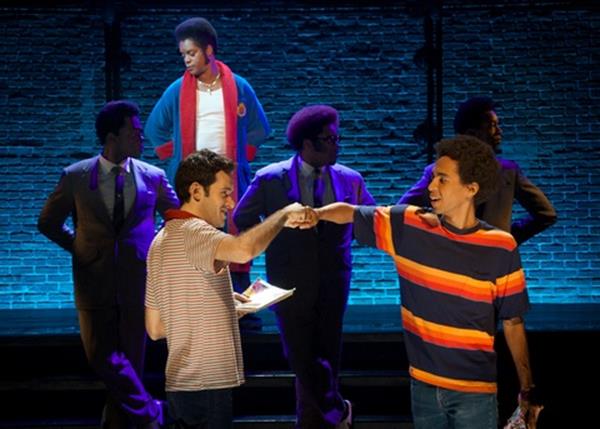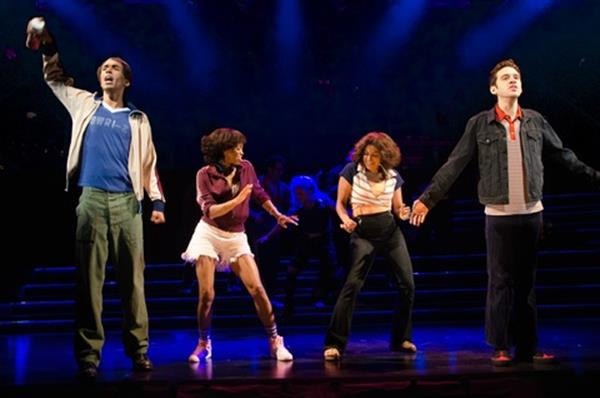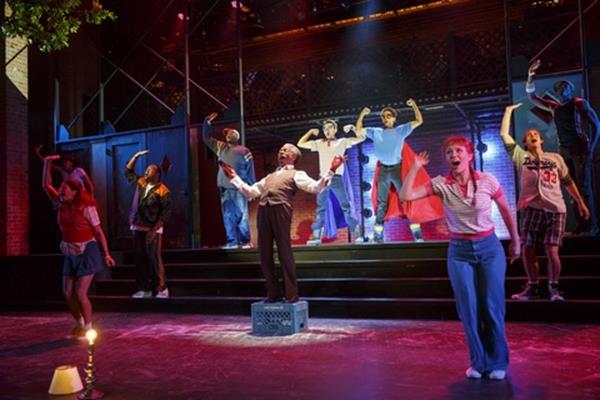The Fortress of Solitude
Ambitious musical version of Jonathan Lethem's novel of coming of age in Brooklyn in the 70's and 80's has a wonderful pastiche score by Michael Friedman.

Adam Chanler-Berat and Kyle Beltran (foreground) and Akron Watson, Kevin Mambo, Juson Williams and Britton Smith in a scene from “The Fortress of Solitude” (Photo credit: Doug Hamilton)
[avatar user=”Victor Gluck” size=”96″ align=left ] Victor Gluck,Editor-in-Chief[/avatar] The Fortress of Solitude, Jonathan Lethem’s acclaimed semi-autobiographical novel of growing up in Brooklyn in the 1970’s and 80’s, becomes the first of his full-length works to be dramatized for stage or screen. The new musical version having its world premiere at the Public Theater, a co-production with the Dallas Theater Center, is an ambitious work from playwright Itamar Moses (Bach at Leipzig, The Four of Us, Back Back Back) and composer-lyricist Michael Friedman (Bloody, Bloody Andrew Jackson, Love’s Labor’s Lost.) A fairly faithful retelling of the novel, Moses’ book telescopes and condenses some of the action to make the convoluted plot stage worthy.
Despite the novel’s length of 511 pages, its focus on the music of its period would make this a natural for musicalization. The resulting show is an unusual stage work blending time and space, realism and magic, and exploring themes of race and gentrification, culture and self-discovery, fathers and sons, and how music defines the generation we live in. The music and lyrics in Friedman’s magnificent and complex pastiche score includes pop, rock, rhythm & blues, soul, punk, hip-hop and heavy metal. While the musical doesn’t entirely reach its goal as of now, it is most of the way to being an extraordinary new theater work. In defining a community and a generation through its music, it attempts to create a new form of musical.
The Fortress of Solitude begins on Dean Street, Brooklyn, in the neighborhood then known as Gowanus and later Boerum Hill. Young white Dylan Ebdus, named for singer-songwriter Bob Dylan by his free-spirited mother Rachel (who dreams of the more colorful life of Berkeley, California), meets his black neighbor, young Mingus Rude, named for jazz musician Charles Mingus and the son of the former lead singer for the soul group, Subtle Distinctions.
When Rachel leaves, the boys find themselves in the same situation, discovering an interest in music and comic books. The motherless boys both have absent fathers: Abraham Ebdus is a self-absorbed avant-garde artist reduced to painting covers for sci-fi novels, while Barrett Rude Junior has become a cocaine addict who stays home and watches television. Gus becomes Dylan’s protector in the ‘hood until Dylan gets into Stuyvesant High School and leaves the neighborhood, while Gus becomes first a graffiti artist and then a drug dealer. When Gus most needs Dylan, he is off to college in Berkeley and a distinguished career as a music critic. Just as Dylan is leaving never to live in the ‘hood again, the violence in Gus’ house erupts between himself, his father and his grandfather, an ex-preacher and former convict paroled to his son’s care. The second act relates Dylan’s return to Dean Street in the late 1990’s to see what has happened to those that never left.

Kyle Beltran, Carla Duren, Rebecca Naomi Jones and Adam Chanler-Berat in a scene from “The Fortress of Solitude” (Photo credit: Doug Hamilton)
The title refers to Superman’s hideout where he can most be himself, just like Dean Street is for the two boys. Aside from the comic book references, the story veers into magical realism when Dylan finds his mother’s ring which gives him and Gus the power to fly. While this is embraced in the musical, it seems a bit undeveloped as it leaves out much of the novel’s explanations. The ending which is different from the novel seems a bit unfinished and fails to wrap up the story although the final production number, “Middle Spaces,” is quite effective in itself.
Conceived and directed by Daniel Aukin, the production is impressive for both how the many scenes and locales segue one into another, and how along with choreography by Camille A. Brown, the musical builds up a community of disparate elements. Friedman’s complex score turns the musical numbers into mini-plays of their own and brilliantly uses the chorus to contribute to the atmosphere and the story line. Eugene Lee’s setting with its 12 doors also helps create the ambiance of Dean Street. Tyler Micoleau’s multi-colored lights at times gives the show a psychedelic feel and are able to turn the stage into a night club for the wonderfully evocative numbers by Barrett Junior and the Subtle Distinctions.
One of the problems with the novel that the musical does not solve is that the protagonist and narrator Dylan Ebdus is mostly an observer and has little personality. While Adam Chanler-Berat (Peter and the Starcatcher, Next to Normal) is believable as Dylan at all the stages in his life, he isn’t very interesting revealing little of himself. As Mingus Rude, Kyle Beltran is a more forceful character, but he too remains an enigma as he does in the novel. Much more powerful is Kevin Mambo’s Barrett Rude Junior, both as the musician he was in the flashbacks and the angry, bitter man he becomes. So too André De Shields as his righteous (though equally sinful) father is a dynamic presence whenever he is on stage. Ken Barnett captures the distant Abraham Ebdus, lost in his art and unable to help either his son or his wife.

The Company of “The Fortress of Solitude” (Photo credit: Joan Marcus)
Among the other characters, Rebecca Naomi Jones turns “Something” into an impassioned number in the second act as Abby, Dylan’s black girlfriend in Berkeley who becomes suspicious his many secrets. As the neighborhood bully in Dylan’s childhood, Brian Tyree Henry fails to be as sinister as intended. David Rossmer as Dylan’s nerdy friend Arthur, a junior high chess and comic book fan, is more effective in his scene as the adult entrepreneur he becomes. As the Subtle Distinctions, (back-up group to Barrett Rude Junior), Britton Smith, Akron Watson and Juson Williams make an impressive harmonizing trio.
While this ambitious adaptation of the Lethem novel by Moses and Friedman may have bitten off more than it can chew, the stage version of The Fortress of Solitude has an urgency that few musicals offer. The remarkable new 1970’s-80’s score and the attempt to tell this story through musical interludes that begin as solos, proceed to duets and quartets and then become company numbers makes this an extremely innovative musical journey of one man’s coming of age. The Fortress of Solitude will grow on you in the course of the evening and leave you feeling that you have also been on a voyage of discovery.
The Fortress of Solitude (through November 16, 2014)
Public Theater, 425 Lafayette Street, in Manhattan
For tickets, call 212-967-7555 or visit http://www.publictheater.org
Running time: two hours and 35 minutes including one intermission






Leave a comment